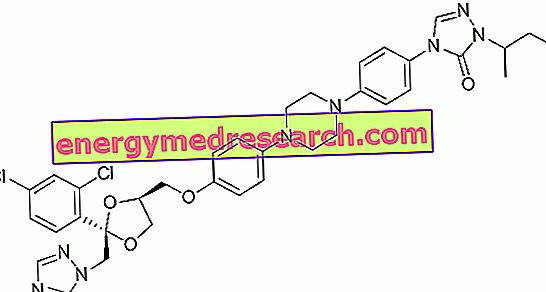Itraconazole is an azole antifungal that is used in the treatment of various types of fungal infections, both superficial and systemic.

Itraconazole - Chemical Structure
Indications
For what it uses
The use of itraconazole is indicated for the treatment of:
- Candidiasis of the mouth, throat and genitals;
- Mycotic infections of the skin and nails;
- Lymphocutaneous sporotricosis;
- Paracoccidioidomycosis;
- blastomycosis;
- Histoplasmosis;
- Invasive aspergillosis in cases where amphotericin B (another antifungal) cannot be administered.
Warnings
Before starting treatment with itraconazole, you must inform your doctor if:
- You have a history of heart failure or if you suffer from breathlessness;
- If you suffer from heart disease;
- If you suffer from liver and / or kidney diseases;
- If you are allergic to other antifungal medications.
Itraconazole can cause side effects that can alter the ability to drive and / or use machinery, therefore, great care should be taken.
Interactions
Patients already on therapy with the following drugs should not take itraconazole, due to the side effects that may occur:
- Astemizole, terfenadine and other antihistamine drugs;
- Cisapride, a drug that is able to increase gastrointestinal motility;
- Nisoldipine and other drugs used in the treatment of hypertension and angina;
- Benzodiazepines, such as midazolam or triazolam;
- Quinidine, an antiarrhythmic;
- Ergotamine, dihydroergotamine or eletriptan, drugs used in the treatment of migraine;
- Statins .
Also - due to the possible interactions that may occur - you need to tell your doctor if you are taking any of the following drugs:
- Rifampicin, rifabutin or isoniazid, drugs used in the treatment of tuberculosis;
- Antiepileptics ;
- Verapamil, digoxin and other drugs used to treat cardiovascular diseases;
- Anticoagulants, such as, for example, warfarin;
- Clarithromycin and erythromycin, antibiotic drugs;
- Indinavir, saquinavir and other antivirals;
- Anticancer drugs, such as docetaxel, busulfan, vincristine or vinblastine;
- Ciclosporina, sirolimus, tacrolimus and other immunosuppressive drugs;
- Anxiolytics ;
- Antidepressant drugs;
- Fentanyl and other opioid analgesics;
- Steroidal anti-inflammatory drugs ;
- Oral hypoglycemic agents ;
- Alofantrine, an antimalarial.
Finally, for at least two hours after taking itraconazole, no drugs must be taken against gastric acid, against gastric ulcer or against indigestion.
If you are on medication that reduces stomach acid secretion, it is recommended to take itraconazole with a cola-based drink.
In any case, it is still advisable to inform your doctor if you are taking - or have recently been - any type of medication, including non-prescription medicines and herbal and / or homeopathic products.
Side effects
Itraconazole can cause various types of side effects, although not all patients experience them. This is due to the different sensitivity that each individual has towards the drug. Therefore, it is not said that all adverse effects occur with the same intensity in each person.
The main side effects that may occur during treatment with the drug are listed below.
Allergic reactions
Itraconazole can trigger allergic reactions in sensitive individuals. These reactions can manifest as symptoms, such as:
- Angioedema;
- Skin eruptions;
- Eye disorders;
- Serum disease.
Blood and lymphatic system disorders
Treatment with itraconazole may cause:
- Leukopenia, ie the decrease in the number of leukocytes in the bloodstream;
- Neutropenia, ie the reduction in the number of neutrophils in the blood;
- Piastrinopenia, ie the decrease in the number of platelets in the bloodstream.
Nervous system disorders
Itraconazole-based therapy can lead to:
- Headache;
- Dizziness;
- paresthesia;
- Hypoaesthesia;
- Peripheral neuropathy;
- Alterations in the sense of taste.
Eye disorders
Treatment with itraconazole can cause visual disturbances, such as blurred vision and diplopia.
Ear disorders
Itraconazole therapy can cause tinnitus (ie an auditory disorder characterized by the perception of buzzing, whistling, rattling, rustling, etc.) and can cause temporary or permanent hearing loss.
Gastrointestinal disorders
Treatment with itraconazole may cause:
- Stomach pain;
- Nausea;
- He retched;
- Diarrhea or constipation;
- Indigestion;
- Flatulence;
- Pancreatitis.
Skin and subcutaneous tissue disorders
During itraconazole therapy, they can occur:
- Skin eruptions;
- Photosensitivity reactions;
- Hair loss;
- Ulcerations of the oral cavity;
- Stevens-Johnson syndrome;
- Toxic epidermal necrolysis.
Kidney and urinary tract disorders
Treatment with itraconazole can cause an increase in the frequency of urination and promote the onset of urinary incontinence.
Reproductive system disorders
Itraconazole therapy can cause changes in the menstrual cycle and erectile dysfunction.
Other side effects
Other side effects that may occur during treatment with itraconazole are:
- Liver damage;
- Jaundice;
- Heart failure;
- Pulmonary edema;
- Anxiety;
- Decreased blood levels of potassium;
- Increased blood levels of triglycerides;
- Temperature;
- Shortness of breath;
- Difficulty breathing.
Overdose
If you suspect that you have taken an overdose of itraconazole, you must contact your doctor immediately and contact the nearest hospital.
Action mechanism
Itraconazole is an azole type antifungal that carries out its fungicidal activity by interfering with the synthesis of ergosterol.
Ergosterol is a sterol that forms the plasma membrane of fungal cells.
Itraconazole - like all azole antifungals - inhibits one of the key enzymes in the synthesis of the aforementioned ergosterol: 14α-demethylase. By inhibiting this enzyme there is an accumulation of ergosterol precursors inside the fungal cell.
The ergosterol precursors - when they reach too high levels in the cell - become toxic to the cell itself and cause alterations in the permeability of the cell membrane and in the functioning of the proteins contained in it. In this way, the fungal cell is condemned to certain death.
Mode of Use - Posology
Itraconazole is available for oral administration (in the form of capsules and oral solution) and for intravenous administration (in the form of a concentrate for solution for infusion).
For the success of the therapy, it is recommended to follow scrupulously the indications provided by the doctor, both as regards the amount of drug to be taken, and as regards the duration of the therapy itself.
Generally, the dose of itraconazole usually administered orally is 100-400 mg, to be taken once or twice a day. The amount of drug to be administered, the frequency of administration and the duration of treatment depend on the type of fungal infection to be treated and its severity.
The use of itraconazole in children under 12 years of age is not recommended.
Also in elderly patients treatment with itraconazole is not recommended, except in cases where the doctor does not consider it absolutely essential.
Pregnancy and breastfeeding
The use of itraconazole by pregnant women and by breastfeeding mothers is not recommended.
Furthermore, fertile women should take adequate contraceptive measures to prevent the onset of pregnancy, both during and after treatment with itraconazole.
Contraindications
The use of itraconazole is contraindicated in the following cases:
- In patients with known hypersensitivity to itraconazole itself;
- In patients already on therapy with certain types of drugs (see the section "Interactions with other drugs");
- Pregnant;
- During breastfeeding.



